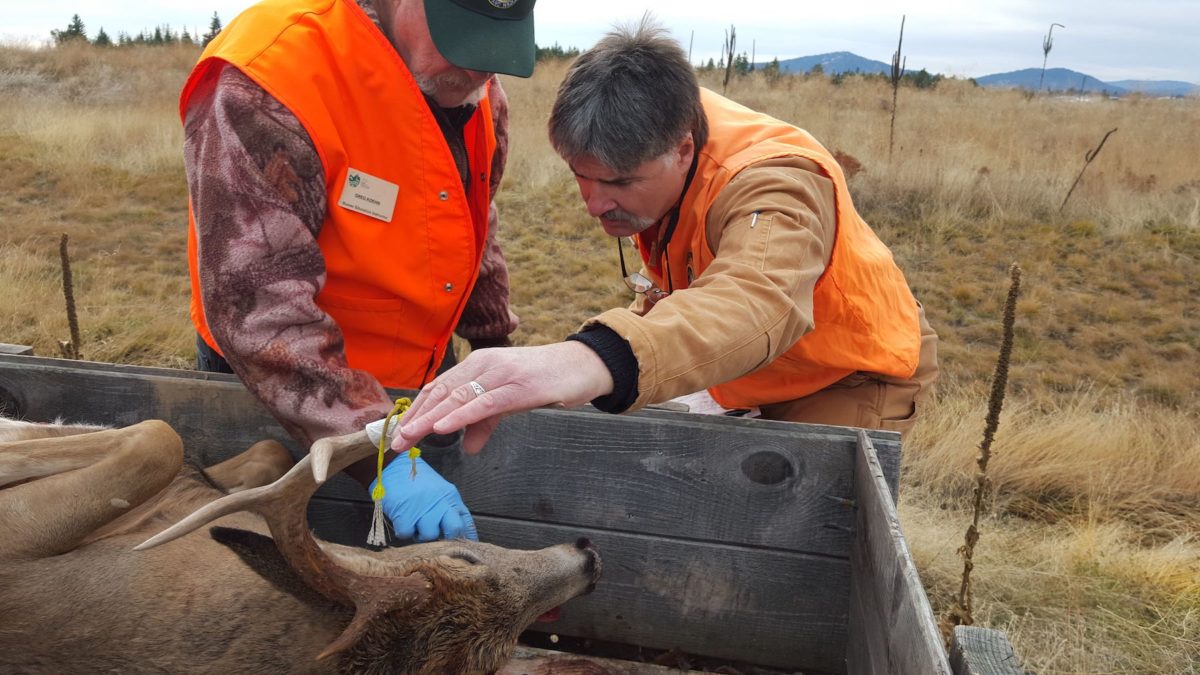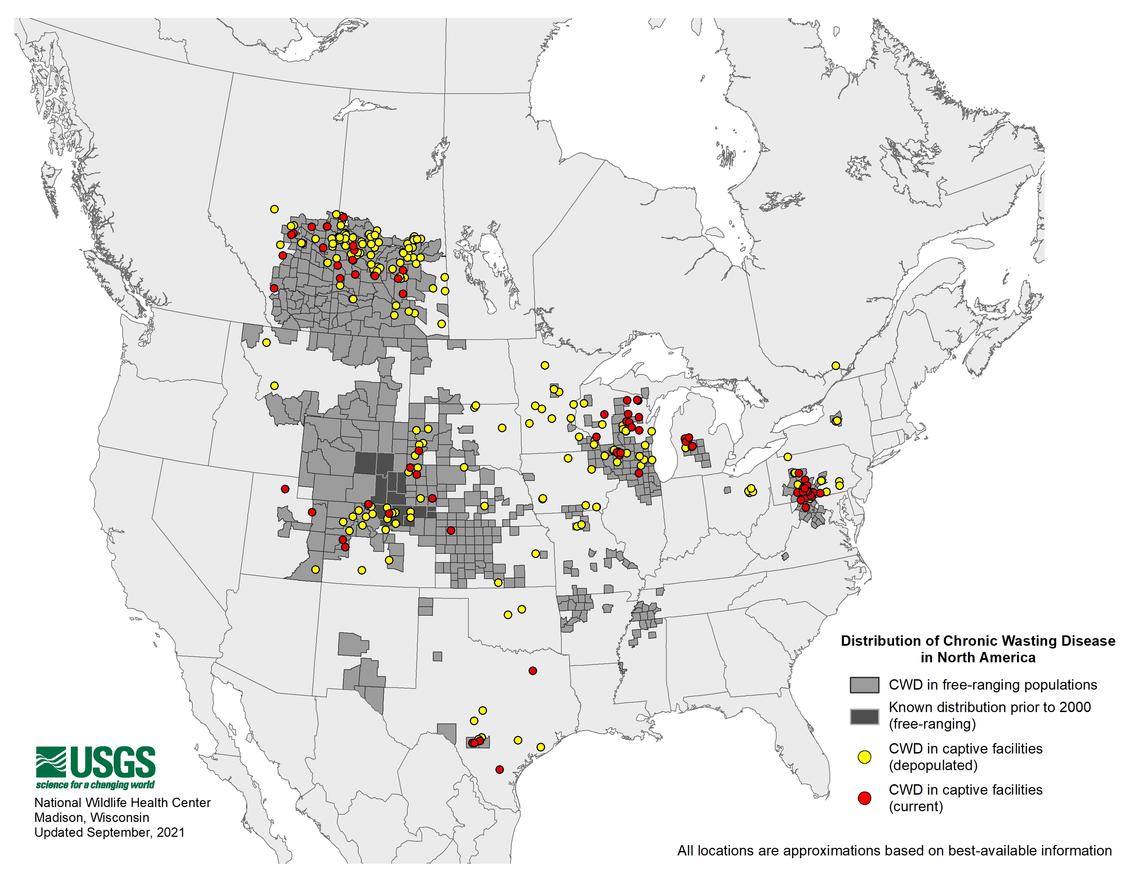NE WA Whitetail Hunters Asked To Help WDFW Survey For CWD This Fall
Whitetail hunters will see more game check stations in Northeast Washington this rifle season as WDFW and volunteers from a local sportsmen’s club team up on a new program to test for chronic wasting disease, a deadly deer family malady.

CWD is not known to occur in Evergreen State deer, elk or moose, but in 2019 it turned up in Libby, Montana, just 70 miles from Newport as the crow flies.
Dr. Melia DeVivo, WDFW’s ungulate research scientist, says that with zero ability to treat this disease that’s 100 percent fatal and which can lead to population declines, Washington’s best bet is prevention.
“Detection of the disease early during an outbreak will allow us to quickly respond to a detection and hopefully contain the disease, and not allow it to spread to other herds,” she said.
Key will be for enough hunters to bring in deer so WDFW can collect a big enough sample to figure out if CWD is present in the state.
“Conducting surveillance at this scale is important because we want to be able to detect the disease early during an outbreak if it does show up in Washington,” DeVivo stated.
WDFW is asking those who kill whitetails in eight game management units to stop by one of six check station locations along Highways 2, 20 and 395, the agency’s Colville or Spokane Valley offices, or the Inland Northwest Wildlife Council’s headquarters in Spokane during October’s general rifle season and November’s late rifle hunt.
Street addresses and operation times for all locations are color-coded at the bottom of this blog.
As for which GMUs biologists want to see deer from, those include Kelly Hill (105), Douglas (108), Alladin (111), Selkirk (113), 49 Degrees North (117), Mount Spokane (124) and Mica Peak (127), which stretch from Laurier and Metalline Falls on the British Columbia border south-southeast to Tekoa, on the Idaho border in the northern Palouse.
“We are asking hunters to help us survey for CWD if they hunt in GMUs in Northeast Washington,” said WDFW spokeswoman Staci Lehman.
Riflemen represent the vast bulk of hunters and deer harvest in these units.
Hunters will be able to get their results online.
Those who salvage roadkilled whitetails in the same units are also being asked to get their deer tested at the locations.

CWD is caused by what are known as prions, described as “mutated proteins” that affect the brain and causes the animal to essentially degenerate as its neurological functions are destroyed.
One way it is spread is deer to deer via bodily fluids such as poop, pee, snot and spit, among others.
To test for for the disease, samples are taken from the neck and head, and DeVivo spent much of her week teaching volunteers how to check lymph nodes, according to Lehman.

Inland Northwest Wildlife Council members were among those who were being trained and they’re looking forward to helping out with the effort.
“Fighting CWD is a big lift and will take efforts from all in our community,” said Marie Neumiller, executive director of the Spokane-based organization.
She also thanked DeVivo for attending a club meeting recently to talk about how dangerous CWD is and steps WDFW is taking.
Per a timeline put together by the Chronic Wasting Disease Alliance, the disease was first seen in captive deer, in 1967 at a Colorado research station and 1979 at a Wyoming facility. Colorado was also where it was first found in the wild, in 1981 with elk and 1985 with mule deer.
In 1996 it turned up at a Saskatchewan elk farm, then in captive herds in South Dakota, and in 2001 and 2002 in wild Wyoming and Wisconsin whitetails. A wild Colorado moose became the first of its species to be diagnosed with CWD in 2005.

WDFW’s new surveillance program reinitiates testing the agency began in 1995 – two years after the state also banned deer farming in response to CWD – and continued for nine years into the early 2000s with samples collected at hunter check stations, as well as from game processors and taxidermists. However, that effort ended in 2012 after federal funding dried up.
Today CWD is found in 27 states and provinces, but luckily still isn’t in Idaho, Oregon or Washington.
“I hate to say it’s inevitable, but if we don’t do what we can to prevent it from infecting our cervid herds, then we should plan on it showing up in Washington,” said DeVivo.
She said CWD prions are “difficult to destroy” as there’s just no good way to eliminate them from deer range at a scale that could begin to halt incidental transmission.
A second way the disease can be moved around is by people transporting the carcasses of infected deer, elk and moose from CWD areas to those where it’s not known to occur.
In late 2017, a Central Oregon man was cited for failing to follow his state’s rules on importing game from CWD states when he brought home a deer that was killed in Montana by a hunter. State biologists and troopers had to collect parts he’d disposed of improperly nearby after he butchered the carcass.
“We don’t want people disposing carcass parts on the landscape, allowing other animals to become infected,” DeVivo said.
Similar to how the disease likely turned up in Northwest Montana, dozens to hundreds of miles from other known outbreaks, it could leapfrog into Washington that way.
“This is why it’s important to follow the transportation rules and safely transport your harvested game back home,” DeVivo said.
Washington’s importation rules only allow for hunters to bring back meat that has been deboned in the state or province it was killed in; skulls, antlers and teeth with no remaining soft tissue; hides/capes sans heads; tissue for lab usage; and completed taxidermy mounts.
The list of locations the CWD rules apply to includes Arkansas, Colorado, Illinois, Iowa, Kansas, Maryland, Michigan, Minnesota, Mississippi, Missouri, Montana, Nebraska, New Mexico, New York, North Dakota, Pennsylvania, South Dakota, Tennessee, Texas, Utah, Virginia, West Virginia, Wisconsin, Wyoming, and Alberta and Saskatchewan, Canada.
Inedible parts should be taken to the landfill or thrown in the trash, said DeVivo.
If another state’s tests show your harvest is positive for CWD, WDFW can help dispose of it correctly, she added.
WDFW’s page on the disease covers the rules on importing deer, elk and moose from CWD states, how to help prevent the spread of CWD, and health and safety information.
“While there is no scientific evidence of CWD being transmitted to humans from animals, the Centers for Disease Control and Prevention recommends not consuming animals that test positive for CWD,” the agency states.
This fall’s game checks in Stevens, Pend Oreille and Spokane Counties will help WDFW learn more about the state’s CWD status, and so too will planned 2022 efforts.
“We secured more funding next fiscal year and plan on expanding our surveillance to additional areas of Eastern Washington,” DeVivo said.
Due to the pandemic, last fall there were no game checks in the Okanogan or northeast corner, but she didn’t believe it put the state at greater risk of having missed CWD.
Prior years saw WDFW check stations in just Deer Park and Chewelah.
TEST STATION LOCATIONS AND TIMES
Colville WDFW District Office – 755 S. Main Street, Colville, WA 99114
Chewelah DOT Gravel Lot – intersection of Sand Canyon Road and Highway 395
Deer Park Weigh Station – 65 N. Arlington Rd, Deer Park, WA 99006
Ione – Tiger Store/Museum, 390372 State Route 20, Cusick, WA 99119
Usk – Crossroads Restaurant, 421341 State Route 20, Usk, WA 99180
Highway 2 Weigh Station – across highway from Spokane Regional Solid Waste
Saturday, October 16 – Sunday, October 17, 2021 9:30 am – 8:00 pm
Saturday, October 23 – Sunday, October 24, 2021 9:30 am – 8:00 pm
Saturday, November 6 – Sunday, November 7, 2021 9:30 am – 8:00 pm
Friday, November 12 – Sunday, November 14, 2021 9:30 am – 7:00 pm
Thursday, November 18 – Friday, November 19, 2021 9:30 am – 7:00 pm
WDFW Colville District Office – 755 S. Main Street, Colville, WA 99114
Spokane Regional Office – 2315 N. Discovery Place, Spokane Valley, WA 99216-1566
Mondays and Thursdays, 4-6 p.m., during modern firearms season:
Inland Northwest Wildlife Council HQ – 6116 N. Market St., Spokane
Call 509-487-8552 to make an appointment
